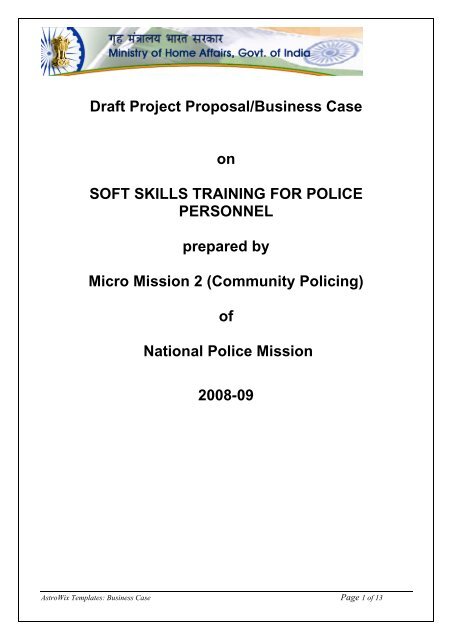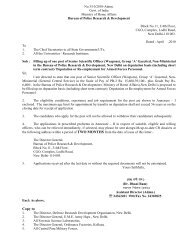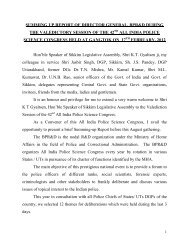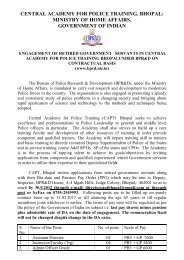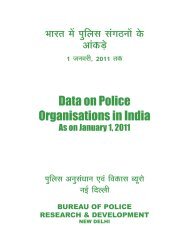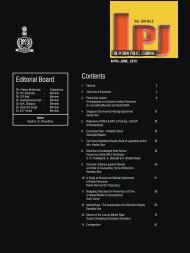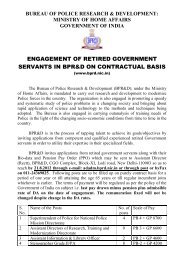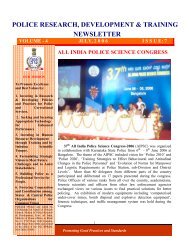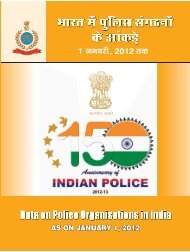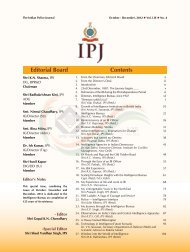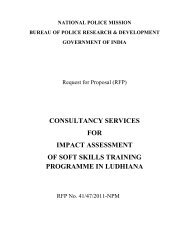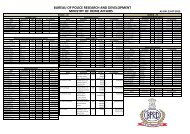Soft Skill Training to Police Personnel
Soft Skill Training to Police Personnel
Soft Skill Training to Police Personnel
- No tags were found...
You also want an ePaper? Increase the reach of your titles
YUMPU automatically turns print PDFs into web optimized ePapers that Google loves.
DOCUMENT INFORMATIONProject <strong>Soft</strong> <strong>Skill</strong>s <strong>Training</strong> for <strong>Police</strong> <strong>Personnel</strong>Project Manager Dr. M.K. Devarajan, ADGP (Int.), RajasthanVersion number 1Draft as of 22-06-09Printed onAstroWix Templates: Business Case Page 3 of 13
DOCUMENT HISTORYDocument sourceMention the location where the document will be s<strong>to</strong>red.Revision his<strong>to</strong>ryVersionnumberDate Summary of changes RevisionmarksApprovalsThe following people have approved this document.Name Function Date ofapprovalSignatureDistributionThis document has been distributed <strong>to</strong>,NameFunctionAstroWix Templates: Business Case Page 4 of 13
Table of Contents1. Introduction/Background .............................................................................. 62. Overview ......................................................................................................... 62.1. Project Title ........................................................................................... 62.2. Vision .................................................................................................... 62.3. Organisational Objective ....................................................................... 73. The Business Case ........................................................................................ 83.1. Purpose of the Business Case .............................................................. 83.2. Sponsor ................................................. Error! Bookmark not defined.4. Situational Assessment and Problem Statement .............................................95. Critical Assumptions and Constraints ......................................................... 96. Implementation Strategy ............................................................................. 106.1. Deliverables ........................................................................................ 106.2. Stakeholders ....................................................................................... 126.3. Related Projects .................................................................................. 126.4. Work Plan .............................................. Error! Bookmark not defined.AstroWix Templates: Business Case Page 5 of 13
Introduction/BackgroundAs far as performance is concerned, Indian <strong>Police</strong> forces are rated amongthe best in the world. However, when it comes <strong>to</strong> image they are ratedamong the worst. The main reason for the difference in performance andperception lies in the attitude and behaviour of police personnel. Hence, ifprogrammes for improving the attitude and behaviour patterns of policepersonnel, especially those at the cutting edge level, viz., police personnelposted in <strong>Police</strong> Stations, Control Rooms, Traffic Branch, ImmigrationCounters, Foreigners’ Registration Counters etc., are taken up, publicperceptions can change, various types of service deliveries by the policewill improve and the police would receive much better cooperation from itsconstituents.2. Overview2.1 Project Title<strong>Soft</strong> <strong>Skill</strong>s <strong>Training</strong> for <strong>Police</strong> <strong>Personnel</strong>2.2 VisionTo improve the attitude and behaviour of police personnel <strong>to</strong> make them citizenfriendly, service-oriented and develop a positive and helping attitude in them.AstroWix Templates: Business Case Page 6 of 13
2.3 Organisational Objectives1. To make the police personnel aware about the nuances of their ownattitudes and behaviour and changes required in them.2. To inculcate in them a citizen-friendly, service-oriented attitude andimprove the service delivery of the police.3 To improve the inter-personnel relations among the police personnel.4 To improve the “hardiness” of police personnel.5 To reduce the stress level of police personnel.6 To improve the role perception and role effectiveness of the policepersonnel.7 To encourage police personnel <strong>to</strong> adopt a problem solving approach.8 To develop positive attitude and social skills.9 To improve the emotional intelligence of police personnel.10 To improve the motivational levels.11 To improve the communication skills.AstroWix Templates: Business Case Page 7 of 13
3. The Business Case3.1 Purpose of the Business CaseA large number of persons who approach the police do so when they are facedwith some problem and at that time they expect a sympathetic hearing from thepolice personnel. They also expect that their problem should receive <strong>to</strong>p priority,however small the problem is. In actual practice, most of the police stations,particularly those in the urban centres, have always their hands more than fulland they find it difficult <strong>to</strong> even grapple the serious problems. In the process,problems that are insignificant in the eyes of the police tend <strong>to</strong> get brushed aside.However, for the individual who has taken the trouble of approaching the policewith the problem, his problem is the mot important one and he gets antagonizedif he is not get listened <strong>to</strong> sympathetically in the police station and his complaintis not acted upon promptly. This is a major dilemma the police have <strong>to</strong> faceevery day. If they have a sympathetic and helping attitude they would listen <strong>to</strong> allcomplainants patiently and sympathetically, try <strong>to</strong> help the complainant, and ifthey are not in a position <strong>to</strong> act immediately on the complaint, or if they are notauthorized <strong>to</strong> take any action at all, they will explain their difficulties <strong>to</strong> thecomplainant. If the police does this, the complainant may not be fully satisfied,but his antagonism will be minimized.Many complaints which come <strong>to</strong> a police station are of a routine nature and if thepolice personnel can deal with them tactfully, they can bring aboutrapprochement and lasting peace among the parties involved in the dispute. Thearrest normally made under the preventive sections of the law in India are, in alarge number of cases, not fully justified, and they result in building upantagonism against the police. If positive attitude and problem solving skills aredeveloped among the police personnel the possibility of this can be minimized.The police are expected <strong>to</strong> be on duty round the clock and they do not even get aweekly off. This coupled with the pressure of work and inherent danger <strong>to</strong> his lifeand limb results in considerable stress among the police personnel. This stressmanifests itself in different ways, one of them being offensive and aggressivebehaviour, particularly with the poor persons who approach the police station.Stress and aggressive behaviour can result in unjustified use of force, use ofabusive language, misbehaviour, which may even result in law and ordersituations.The police may often tend <strong>to</strong> forget that all the persons visiting the police stationare not criminals or anti-social elements. In fact such people hardly ever visit thepolice station on their own, they are arrested and brought <strong>to</strong> the police station.AstroWix Templates: Business Case Page 8 of 13
The persons who voluntarily visit the police station are complainants of varioustypes, witnesses and others who want <strong>to</strong> get different types of work done.<strong>Police</strong>men often tend <strong>to</strong> club these categories of persons also with the criminalsand behave in a very negative fashion with them, which is the major cause forpoor police image in India. If the attitude and behaviour of the police personnelare improved, the service delivery by the police will au<strong>to</strong>matically improve andresult in considerable cus<strong>to</strong>mer satisfaction.3.2 SponsorLooking <strong>to</strong> the large number of personnel involved in policing in India, especiallythose who come in contact with the citizens on a regular basis, the execution of asoft skills training programme will involve huge costs. Hence, it is proposed thatpart of the programme can be done in the PPP mode and the rest sponsored bythe central and state governments. Organizations like the FICCI and the CIIhave already come forward <strong>to</strong> sponsor such programmes in different parts of thecountry. Industrial houses of repute and management institutes can also berequested <strong>to</strong> sponsor such programmes. Whatever the gap is left will have <strong>to</strong> befilled up by the central and state governments. The conduct of such programmeswill primarily the responsibility of the state governments. However, many stategovernments may not be in a position <strong>to</strong> launch them in a major way due <strong>to</strong>financial constraints. Hence, the central government may consider making it apart of <strong>Police</strong> Modernization Programme and partly fund it.4 Situational Assessment and Problem StatementExperience has shown that police personnel at the cutting edge level, whonormally have no exposure <strong>to</strong> soft skills training programmes, are quite receptivewhen they are exposed <strong>to</strong> such programmes. A perceptible change in theirattitude and behaviour can be seen after they undergo a 2-3 day soft skillstraining module. There are two major problems which are pertinent <strong>to</strong> soft skillstraining in police personnel viz. (i) the large number of personnel involved andthe consequent costs and (ii) the requirement of putting the personnel throughsuch programmes at the intervals of at least every six months.5 Critical Assumptions and Constraints ……..Assumptions ……1. <strong>Police</strong> personnel at the cutting edge level will develop a positive attitudeand better behaviour if they are given soft skills training.AstroWix Templates: Business Case Page 9 of 13
2. The motivation levels and the work output of the police personnel willimprove through soft skills training programmes.3. The stress level of police personnel can be reduced through soft skillstraining programmes.Constraints....1. The effect of soft skills training programmes tend <strong>to</strong> wane with passage oftime.2. Many police personnel find it difficult <strong>to</strong> implement some of the techniquestaught by trainers in their actual work situation of the police station.6 Implementation StrategyThe first step will be <strong>to</strong> do a <strong>Training</strong> Need Analysis (TNA) by a group of H.R.experts. Thereafter they can formulate appropriate training modules.The <strong>to</strong>pics which are generally covered by trainers who give soft skills training <strong>to</strong>the police personnel include - Psychological mapping for understanding self and others. Effective inter-personnel communication and team building. Role perception and role effectiveness. Emotional intelligence. Stress and time management. Self-motivation and motivating others. Conflict resolution. Developing organizational effectiveness. Developing assertiveness. Managing change.The conceptual/theoretical input during such trainingprogrammes should be kept <strong>to</strong> the minimum. The methodology of thetraining should lay more emphasis on the use of recognized instrumentsfor psychological testing, use of case studies, role plays, interactivesessions, group tasks etc.AstroWix Templates: Business Case Page 10 of 13
The duration of these programmes should be ideally 2-3 daysonly. There should be refresher programmes every 4-6 months,particularly during the initial period, since the effect of such trainingprogrammes start waning gradually. Longer duration programmes may notbe cost effective and their outcome tend <strong>to</strong> drastically reduce after 2-3days. Hence, repeat programmes at intervals will be ideal.The use of police officers/personnel for imparting soft skillstraining programme, after putting them through a training of trainers’course, may not be a feasible idea. On the one hand all, police forces inIndia face serious problems in getting trainers with proper attitude andcareer graph. On the other, police officers, even after undergoing atraining of trainers’ courses, will only be able <strong>to</strong> impart the theoreticaltraining. They may not be in a position <strong>to</strong> develop the necessary skills andattitudes among the participants, which actually is the aim of these trainingprogrammes. Hence, for imparting soft skills training, professional trainerswill have <strong>to</strong> be engaged.For optimum results and cost effectiveness soft skills training can be coupledwith counselling. Counselling can be done by seniors, colleagues (peercounselling), and by psychologists. Generally, group counselling willsuffice. However, in the case of some personnel having seriouspersonality problems, this can be supplemented with individualcounselling.<strong>Police</strong> officers/personnel, however, can be used forcounselling. Peer counselling is a cost effective and quick means <strong>to</strong> targetthe wide base of the police force – the constabulary. Articulate andmotivated Constables having positive attitude and good track recordof work performance can be trained in the art of counselling by apsychologist. They can then be deputed <strong>to</strong> police stations <strong>to</strong> periodicallydo group counselling of Constables there. During the initial counselling theConstables are likely <strong>to</strong> come up with lots of ‘ifs’ and ‘buts’ and raiseseveral problems, the answers <strong>to</strong> which can be suggested by the policeofficer who are involved in the training of the counsellors. These trainedcounsellors can also used <strong>to</strong> do group counselling during training coursesorganized for Constables. Such counselling programmes can besupplemented by counselling by senior officers who can also be trained forthis by psychologists and police officers. This will be an almost zero costinitiative. If peer counselling is supplemented by soft skills training theAstroWix Templates: Business Case Page 11 of 13
attitude and behavioural patterns of police personnel at the cutting edgelevel can be improved very quickly.6.2 Mission StatementThe mission statement is: “Sensitized <strong>Police</strong> for Empowered Society”(Samvedi <strong>Police</strong> – Sasakth Samaj)6.3 Deliverables1. Problem solving approach, better motivation, increased work output.2. Improved service delivery by the police.3. Positive attitude and better behaviour among the police personnel.4. Better public satisfaction and cooperation from the public.5. Improved police image.6.4 Stakeholders1. <strong>Police</strong> personnel2. <strong>Police</strong> Department3. Central and state governments4. Sponsors5. Community6.5 Miles<strong>to</strong>nes1. <strong>Training</strong> Need Analysis.2. Drafting of curricula.3. Identification of resource persons.4. Funding/sponsorship.5. Conduct of soft skills training modules.6. Peer counselling.7. Counselling by seniors, psychologist.8. Impact study.9. Refresher programmes.AstroWix Templates: Business Case Page 12 of 13
7.0 Budget requirementsSince the number of police personnel who have <strong>to</strong> be put through suchprogrammes run in<strong>to</strong> several lakhs, refresher modules are <strong>to</strong> be conductedperiodically and the programmes are <strong>to</strong> be conducted by H.R. professionals whoare specialist in this field, the cost of training will run in<strong>to</strong> several crores ofrupees. A single programme may cost anywhere between Rs. 5,000/- <strong>to</strong>50,000/- depending upon level of the resource persons. On an average, it canbe safely assumed, that about Rs. 10,000/- <strong>to</strong> 20,000/- will have <strong>to</strong> be spent onone module for a group of 25-30 persons.Related Projects1. <strong>Police</strong>-Community Partnership (PCP)2. Community Counselling CentresAstroWix Templates: Business Case Page 13 of 13


